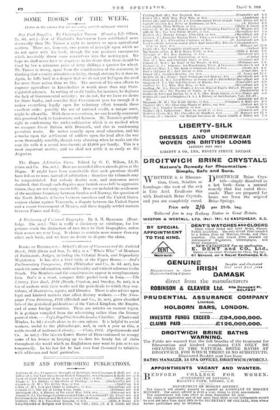SOME BOOKS OF rffIE WEEK.
[notice in flat e)litmo (t )es 713: ace;utriti prc I sul•stritn! reties] Oar Fond Supplics. By eh:islet:her Tumor. (County Life Offices.
23. fid. net.)—Few of England's landowners have established more deservedly than Mr. Tumor a tight to instruct us upon agricultural matters. There are, however, two points of principle upon which we do not agree with his book, though the war produces emergencies which inevitably throw some convictions into the melting-pot. We hope we shall never have to acquiesce in his desire that there should be fixed by law a minimum price of forty shillings a quarter for wheat. Mr. Tumor is wrong, apart from the consideration of the consumer, in thinking that security stimulates activity, though striving for it does so. Again, he falls back in a despair that we do not yet fee! upon the need for more State action than we like. The success of his own efforts to improve agriculture in Uncoil:shim is worth more than any State- regulated schemes. In writing of crodit banks, for instance, he deplores the lack of Governmental activity : we do not, for we have no desire for State banks, and consider that Government goes far enough if it makes everything legally open for voluntary effort towards these excellent ends : possibly the use of national credit, a unique asset, might be allowable. With these reservations, we can heartily commend this practical book to landowners and farmers. Mr. Tumoris perfectly right in condemning the under-cultivation which is so marked when we compare Great Britain with Denmark, and also in condemning prevalent waste. He writes soundly upon rural education, and his remarks upon the settlement of soldiers upon the land after the war seem thoroughly sensible, though very alarming when he works out the cost (Ile calls it a sound investment) at £1,000 per family. This is a most important matter, and we shall not settle it so easily as did Augustus.


































 Previous page
Previous page